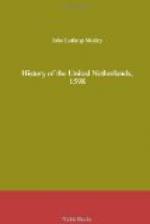Having so ill-succeeded in their attempts to prevent the treaty between France and Spain, they were now engaged in what seemed also a forlorn hope, the preservation of their offensive and defensive alliance with England. They were well aware that many of the leading counsellors of Elizabeth, especially Burghley and Buckhurst, were determined upon peace. They knew that the queen was also heartily weary of the war and of the pugnacious little commonwealth which had caused her so much expense. But they knew, too, that Henry, having now secured the repose of his own kingdom, was anything but desirous that his deserted allies should enjoy the same advantage. The king did not cease to assure the States that he would secretly give them assistance in their warfare against his new ally, while Secretary of State Villeroy, as they knew, would place every possible impediment in the way of the queen’s negotiations with Spain.
Elizabeth, on her part, was vexed with everybody. What the States most feared was that she might, in her anger or her avarice, make use of the cautionary towns in her negotiations with Philip. At any rate, said Francis Aerssens, then States’ minister in France, she will bring us to the brink of the precipice, that we may then throw ourselves into her arms in despair.
The queen was in truth resolved to conclude a peace if a peace could be made. If not, she was determined to make as good a bargain with the States as possible, in regard to the long outstanding account of her advances. Certainly it was not unreasonable that she should wish to see her exchequer reimbursed by people who, as she believed, were rolling in wealth, the fruit of a contraband commerce which she denied to her own subjects, and who were in honour bound to pay their debts to her now, if they wished her aid to be continued. Her subjects were impoverished and panting for peace, and although, as she remarked, “their sense of duty restrained them from the slightest disobedience to her absolute commands,” still she could not forgive herself for thus exposing them to perpetual danger.
She preferred on the whole, however, that the commonwealth should consent to its own dissolution; for she thought it unreasonable that—after this war of thirty years, during fifteen of which she had herself actively assisted them—these republican Calvinists should, refuse to return to the dominion of their old tyrant and the pope. To Barneveld, Maurice of Nassau, and the States-General this did not seem a very logical termination to so much hard fighting.
Accordingly, when on the 26th of May the two envoys fell on their knees— as the custom was—before the great queen, and had been raised by her to their feet again, they found her Majesty in marvellously ill-humour. Olden-Barneveld recounted to her the results of their mission to France, and said that from beginning to end it had been obvious that there could be no other issue. The king was indifferent, he had said, whether the States preferred peace or war, but in making his treaty he knew that he had secured a profit for himself, iuflicted damage on his enemy, and done no harm to his friends.




